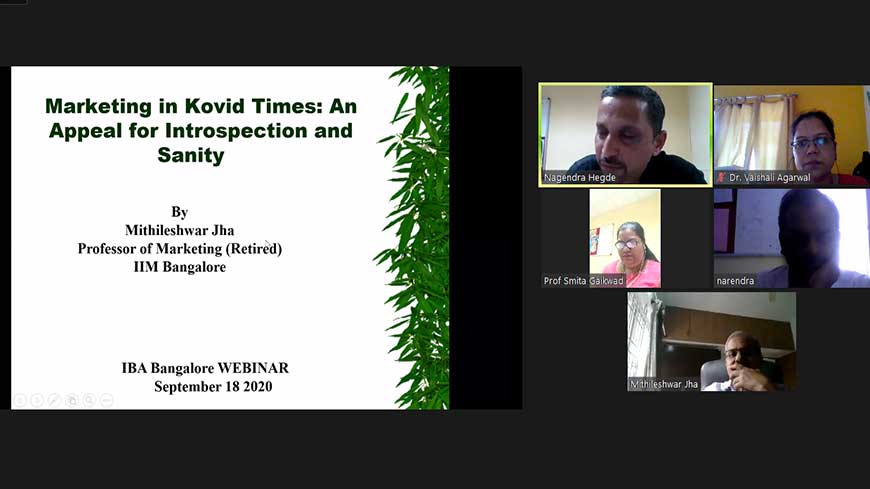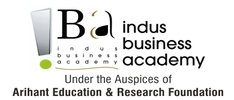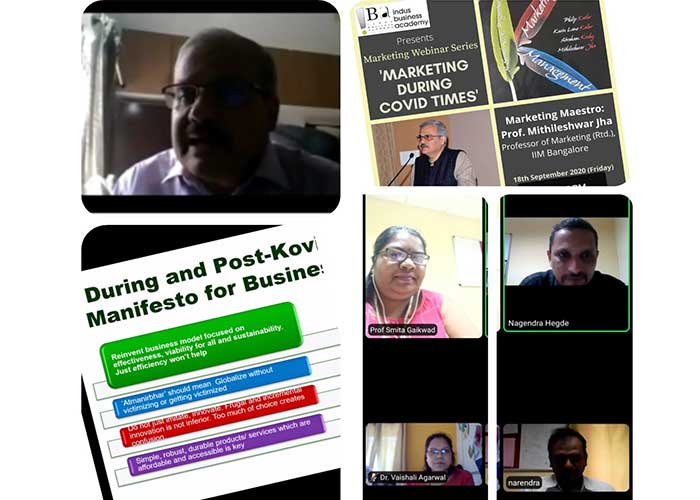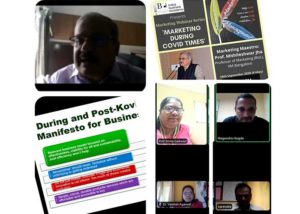
Webinar by Dr. Mithileshwar Jha
Webinar by Dr. Mithileshwar Jha
On
“Marketing During COVID Times”
Organizer: Indus Business Academy, Bangalore
Speaker: Dr Mithileshwar Jha, Professor of Marketing (Retd), IIM, Bangalore
Participants: Students and Faculty members of IBA, Research scholars, Faculty members from other institutions, Alumni of IBA
Prof. Mithileshwar Jha gave a brief introduction about the tough challenges businesses are tackling today and how the market is affected more by the mindset with which a person looks at the situation. Following are the excerpts from the webinar.
- Jha explained the COVID and said it is still an unknown mystery whether it is a lab-made virus or a natural disaster. People are still struggling to figure out whether it is a curse or a blessing. Whatever be the origin of the virus, now businesses and markets are impacted to a great extent. He gave an example of the company Sears, which was the predecessor of the company Walmart. This company had the main focus on guaranteed customer satisfaction. They entered the market during the long period of recession during the 1920s. They assumed that the situation would prevail for a very long time, and they started retrenching people, started closing the shops, selling properties; they took all measures of hardcore cost-cutting. They decided to relocate as that was a time when properties were at their lowest prices and people were in distress. They also took a step towards retaining people because they thought retention, can earn their loyalty. So, they believed in retaining jobs but relatively cutting down their salaries. They cut down their advertisement expenses but respected the jobs of their employees and their positions. During the Second World War, Sears began to rise, and their sales gradually shot up. The assumptions and belief of Sears helped them stood apart during such a recession period. The more the experience, the more the businesses gain regarding their ability to make accurate assumptions. Sometimes, businesses suffer due to faulty assumptions by them. For example, Walmart made a move towards digitalization but failed. No matter how much the world is becoming digital, there is no substitute for the brick and mortar stores, as people get physical acquaintance with the products. Prof. Jha concluded this topic by saying that positive and negative assumptions impact the business vastly.
- Business models and success formula needs to be questioned, time and again. What resulted in success once may end up having an adverse impact in future.
- Jha made a rare reference to the changing education system, which is more of Edutainment (Education-Entertainment). He shared his personal experience, where he witnessed his colleagues using films for teaching and even sometimes becoming magicians.
- It is quite often said that change is the new constant, and changing in tough times like COVID is the only way to sustain in the market. He cautioned business firms that the core principles of the business should remain intact, and some aspects can change for sustenance in the market.
- People with an economics background and governance background saw two rules for marketing; one is raising aspirations, and the second, is fulfilling those aspirations. In India, we have done well to raise aspirations, but not in fulfilling those aspirations.
- Is our GDP driven economic model still relevant? Prof. Jha gave an example to ponder on. Bhutan, as a country, has changed the game so rapidly, and India, on the other hand, is still known as a developing country. Bhutan has become the gross happiness creator, and India is the top contributor to this happiness. We can take a lesson from Bhutan to concentrate on gross happiness rather than on GDP growth.
- He gave an example of a lady in a village, a mobile phone operator, who used to have 10-15 mobile phones, anybody who needed them, can borrow it from her for use and return it to her for a price. The learning from this is that ownership is not necessary for increasing consumption, but accessibility is.
- Before COVID, business used to pay a high amount of cost in creating the office culture and now, after COVID, people are working from home. The learning here is that apart from essentials, everything that increases cost should be questioned.
- Many businesses have this common question of how to increase efficiency? Prof. Jha noted that COVID has not only forced us to cut costs but also question the factors, that don’t add value.
- All of us know that natural resources are limited, and both economists and psychologists tell us that there is a limit, and we should consume it wisely. But, the human tendency is to use new things, so we keep moving from one to another. Consumer and environment both are critical resources for a business and should be taken care of.
- Both Demonetization, and COVID, made many people stand in a queue. It brought out both the best and the worst in us.
- During tough times like COVID, the market has a role to play, which is to maintain the confidence of consumers.
- Characteristics and challenges of our market.
Characteristics:
- Resource abundance, yet periodic surpluses and periodic shortages.
- Unorganized market leading to issue of inefficiency and inequity
- Volatile, uncertain, complex and ambiguous (VUCA) environment.
- Extremely value-conscious customers, but values are declining in society.
Challenges:
- We have high potential- many individuals, few consumers, and very few citizens
- Huge disparities leading to dysfunctional conflicts and aspirations
- Market and non-market multiple pulls and pressures.
- What should be our manifesto during COVID and post COVID? Who will drive that? He explained that it is not the responsibility of the market or the government alone, but we all have to drive it together.
- During and post COVID – Manifesto for consumers, clients and citizens
- Consumers: are mostly autonomous, but many do not know what is good for them. More so, the educated amongst us.
- Clients: with limited autonomy, they are also relevant for health, education and legal services. For example, students are not customers for institutions but rather clients.
- Citizens: have rights and duties.
- During and post COVID manifesto for businesses
- Reinvent business model focused on effectiveness, viability for all, and sustainability, efficiency alone will not help.
- Atmanirbhar should mean being Global without victimizing the local.
- Do not just imitate, but also innovate. Frugal and incremental innovation is not inferior, and also too many choices create confusion.
- Simple, robust, durable products/services which are affordable and accessible is the key.
- Promotion of responsible business practices with responsible consumption should be done and not cross capitalization and materialism.
- Movement for an assured minimum quality of life for all will result in a more equitable society.
- Branding as an assurance makes more sense than branding for premium.
- Managing costs, availability, affordability, and accessibility makes more sense.
- Power/Politics, PR and Publicity, and People have become important Ps.
- Balance interests of all stakeholders, not just shareholders and customers. Current levels of temps with high wage disparity is not sustainable.
- Culture, identity and values, might be the three pillars of sustainable management, but we must practice what we preach.
- Manifesto for governance:
- Demand stimulation is the need of the hour. Government should put money in consumers hand with an incentive for spending, not saving.
- Differentiate between consumers, clients and citizens.
- Anxious and uncertain future facing citizens require assurance from credible sources. Politicians and bureaucrats are the least credible in the current environment. Also, political manifestos are the most deceptive.
- Issues on sustainability:
- Need vs greed – an acknowledgement of the difference between need and greed should exist in mind to draw a line between their requirements and greediness.
- Equity vs Equality – In the long run, equity is going to be the pillar that will lead to sustainability.
- Responsible production and consumption chain vs per capita income
- Not taking away from the future generations.
Concluding Remarks:
We need marketing Mahatmas and not warriors. We need not just fight current situations but also create new opportunities. We need a combination of gardeners, farmers and foresters to collectively create a sustainable ecosystem.
Prof. Mithileshwar Jha gracefully answered questions from the participants. The questions were ranging from Market Economics, Governance to Leadership, and a few were sector-specific. Prof. Smita Gaikwad, IBA Bangalore, greeted the Speaker and the participants with a Welcome speech. Prof. Nagendra Hegde, IBA Bangalore, moderated the Speaker-Attendee interaction, and the webinar concluded with a Vote of thanks.
Tag:Guest Lecture, webinar


